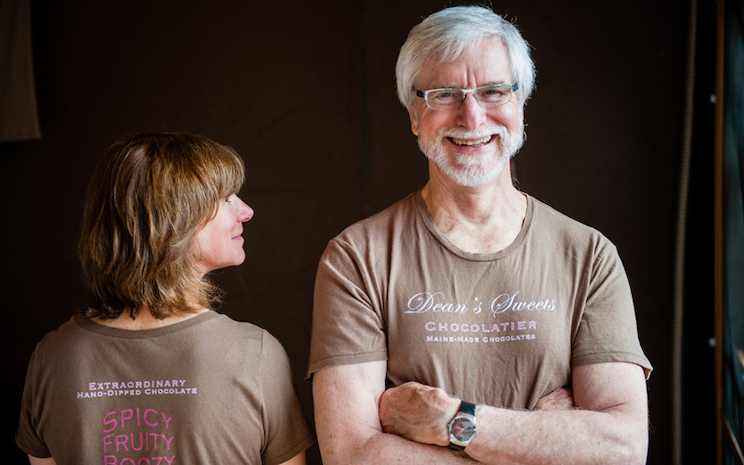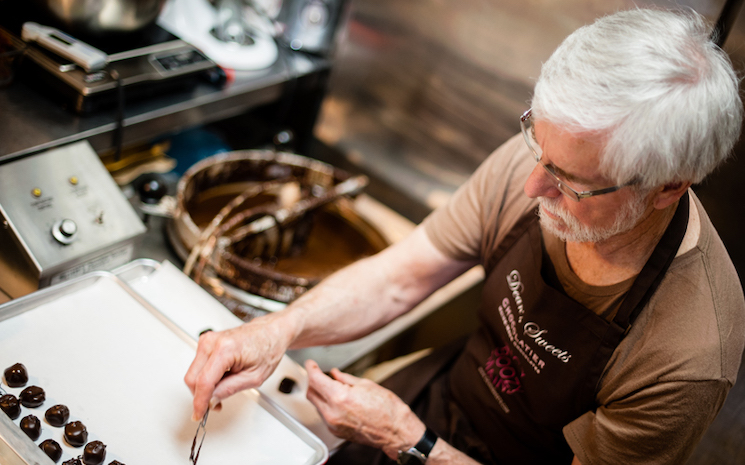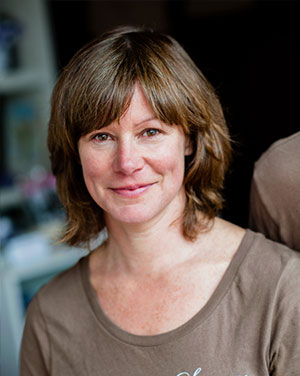
Finding the Sweet Spot: Confessions of a Chocolate Business Owner (and of Married Business Partners!)
By Kristin Thalheimer Bingham | Originally published in Creative Maine Magazine, MAY – JUNE 2021 ISSUE
Whenever I meet someone new (back when meeting someone new used to happen) and tell them I’m married to a chocolatier, the most common response is, “Oh my god, you are so lucky!” Then I tell them we’re co-owners of our chocolate business, Dean’s Sweets, and that Dean and I work together every day. At that point they usually say, “Oh, wow, I could never work with my husband.”
Yes, it’s definitely true, I’m lucky. I’m lucky to live in Maine. I’m lucky to be healthy and to be my own boss. I’m lucky to be married to Dean and be surrounded by chocolate. Not only is Dean an amazing chocolatier, but he’s also the chef for most of our meals at home, a great dishwasher and a top-notch general handyman.
He comes by the handyman talent in part because he spent the first 40 years of his career—before we started the chocolate business—as an architect, often working with builders. Those architect skills are still with him. Dean designed and built the wooden ceiling in our Fore Street store and put in the refurbished windows that let customers see the chocolate-making facility from the retail area. He puts up drywall, hammers a darn good nail and can fix almost anything that’s broken.

As for working together all day, every day, we do pretty well. At least now we do. Fourteen years into our marriage and 16 years into our business, our division of labor has blessedly solidified. He whirls the KitchenAid mixer while I put chocolate in boxes. He tempers the chocolate while I work with our team and customers. He dips 1,000 truffles while I write marketing emails, design labels and do battle with QuickBooks.
But what fun would it be if there weren’t also major frustrations as husband-and-wife business partners? In the early days, we had “business meetings” because that’s my background (I have an MBA and managed illustrators, authors, schedules, and budgets in educational publishing before Dean and I met). For these business meetings, we each had our to-dos and deadlines, our small doable tasks that, when added and multiplied, would slay dragons and perhaps keep us in business for another season. As a linear thinker, I always got my to-dos done so I could come to the meeting and get a gold star.

As the creative chocolatier in the family, Dean didn’t always do his to-dos. He was in the kitchen working all week, occasionally making other things not on the plan. Week after week, I’d model appropriate task-completion behavior. “See, Honey, that’s how we get to check it off the list. We do the task.” When, a week later, Dean’s agreed-upon task was still not done, I was beside myself. “Wait. What? You agreed you’d work on the bourbon pomegranate gorgonzola crème de cacao bon bon. What happened?”
“I made a stout truffle instead.”
“What, with beer? That’s not in our business plan.”
“I know, but I felt like trying that.”
This went on for quite some time. I cajoled, I criticized, I cried.
And then one day I had a major aha. You’ll have to go with me on this one because it’s not chocolate-related. It was at our home in Portland, roughly 2007, a year after we were married, three years after we started the business. In front of our house there are five slate steps. One of the steps had a chunk missing in the front and the slate was chipping off in thin layers, crumbling more each day. It was hazardous to anyone walking those steps—the mail carrier, for example, and the kids who lived upstairs. Never having owned a home before, and struggling to pay the mortgage each month, I fretted for weeks about how to get this step fixed. Where would we find new slate? Would it be too heavy to lift? How could we afford this? For weeks, these questions swirled in my head. And because fretting took on a weird new feeling as a newlywed and business partner, I didn’t say anything to Dean. I just fretted.
Until, one day, as we were walking out the front door, awkwardly stretching over the broken step, I said, “I’m so freaked out by this step! I don’t even know how to get a new step, or what we have to do. Where do you get slate? Is it expensive to fix?” And in that moment, Dean walked back up to the step, lifted the front edge, and flipped it over, so that the broken side was now facing down and backward. Dean put his weight on the step, pushing it into place and burying any evidence of the chipping in the riser of the next step up. Done. Problem solved.
It had not ever, for one second, occurred to me that we could fix the step simply by flipping it over. This was a complete revelation to me. In less than 10 seconds, fixed.
So this is what I learned that day: Business meetings with to-do lists don’t work well for Dean, the creative in the family. Mini-meetings do. We sometimes have 10 one-minute meetings per day. While I work linearly, Dean works circularly, sometimes finding solutions to things by working on something else entirely. I like solutions; Dean likes problem solving. I came to respect the way his mind works differently from mine in that instant he flipped the step. Sometimes, I work at things too hard.
That’s not to say it resolved all of our strife, and that we never had conflict again. It is to say that I learned to trust our differences, especially in problem solving—which is, by the way, at least 50% of what it takes to build a business—in a more profound way. It still nearly kills me when Dean wants to ponder something and I want an answer, now. But I huff away from the mini-meeting knowing it’s for the best. Time and pondering and opposing views will get us better results. Our business is stronger precisely because of our different ways of thinking, even if I resist it half the time.

I have a lot of choices and freedom in my life, and I get to struggle with things I care about. I get to eat chocolate whenever I want. And I get to work with my husband who, nowadays, does a little better with his to-dos and thinks in wonderfully, frustratingly circular ways. No question about it, we’re learning from each other, and no question, I’m lucky because of it.
Dean’s Tips for Both Chocolate-Making and Architecture:
- Relax—it will always work out. And in the case of chocolate, it will almost always taste good.
- Use the best ingredients whenever possible.
- Pay attention to measurements, room temperature and air flow.
- Whether a renovation or new construction, it will always cost twice the budget and take double the time; chocolate may double or triple your friends.